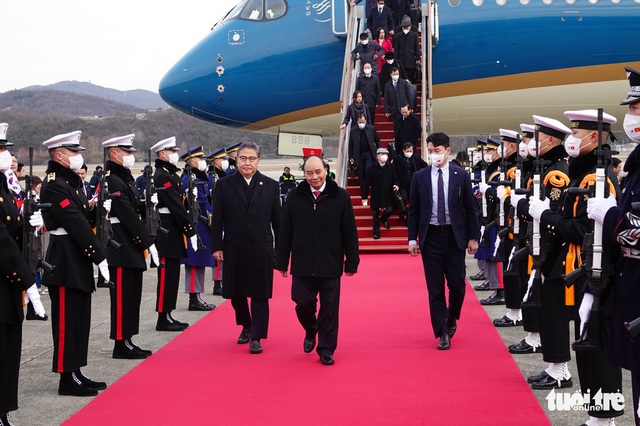President Nguyen Xuan Phuc starts State visit to Republic of Korea
VGP – President Nguyen Xuan Phuc and his entourage arrived in Seoul on Sunday afternoon (local time), starting his three-day State visit to the Republic of Korea at the invitation of Korean President Yoon Suk Yeol.

President Nguyen Xuan Phuc arrives in Seoul on December 4, 2022, starting his three-day State visit to the Republic of Korea
President Nguyen is accompanied by Standing Deputy Prime Minister Pham Binh Minh, Minister ò Foreign Affairs Bui Thanh Son, Minister of Planning and Investment Nguyen Chi Dung, Minister of Industry and Trade Nguyen Hong Dien, Minister of Culture, Sports and Tourism Nguyen Van hung, Minister of Health Dao Hong Lan, Minister-Chairman of the Presidential Office Le Khanh Hai among others.
This is the first visit to the Republic of Korea by Nguyen since he was elected President of Viet Nam in 2021 and he is the first foreign leader to visit the Northeast Asian country since President Yoon took office.
Viet Nam and the Republic of Korea established diplomatic relations on December 22, 1992 and upgraded the relationship to comprehensive partnership in 2001 on the occasion of Vietnamese President Tran Duc Luong's visit to the Republic of Korea.
Both countries further elevated the bilateral ties to strategic cooperative partnership in October 2009 during the Viet Nam visit by Korean President Lee Myung-bak.
Regarding political ties, national defense-security cooperation, the exchange of delegations and bilateral meetings has been maintained in both online and in-person formats.
As of September 2022, the the Republic of Korea remained the largest foreign investor in Viet Nam with more than US$80 billion, accounting for 18.6 percent of the total investment in the Southeast Asian country.
The Republic of Korea has pledged to offer Viet Nam with US$1.2 billion in preferential loans from 2012 to 2020, becoming the second biggest provider of official development assistance for Viet Nam.
The Republic of Korea was Viet Nam's third largest trade partner with the two-way trade reaching US$66.65 billion in 2019, US$65 billion in 2020, and US$78 billion in 2021.
As both sides signed a free trade agreement and the Regional Comprehensive Economic Partnership (RCEP), the two countries expect to raise the two-way trade to US$100 billion in 2023 and US$150 billion by the end of this decade.
The two countries have been coordinating closely on regional and international issues of shared concern, including the East Sea and the Korean Peninsula, and fostering collaboration at multilateral forums and organizations./.

